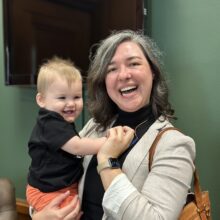Hertford and Northampton counties aim to eliminate early childhood suspensions

Katie here, writing to you from beautiful Morganton, where Liz and I spent a few days with the community college leaders who prepare the bulk of our state’s early childhood workforce.
Earlier in the week my attention was in the opposite corner of the state, in two majority-Black counties near where I grew up — Hertford and Northampton. The Hertford-Northampton Smart Start Partnership for Children is working with the Educational Equity Institute (EEI) to create a community-based model designed to eliminate the use of exclusionary discipline in early care and education settings.
Exclusionary discipline includes any action that removes a child from their learning environment as a way to address behavior challenges. This might mean sending them to another classroom or an administrative office (exclusion), sending them home for a day or more (suspension), or telling their families the child is no longer welcome at the site (expulsion).
As EEI President Ebonyse Mead explained, in places where staff and resources are strained, staff members might “use suspensions as a first resort” for handling behavioral issues.
There’s no evidence that exclusionary discipline prevents or improves challenging behaviors. And there’s ample evidence that it harms not only the children who are being excluded, but also children who remain and the overall learning environment. Black children — especially boys — are disproportionately affected by exclusionary discipline compared to their peers, regardless of socioeconomic status.
The Hertford-Northampton project to end reliance on exclusionary discipline is being led locally by Stacey Henderson, executive director of the Smart Start Partnership.
Mead told me the first year of this three-year project is about “capacity building.” Her team started by training the Smart Start staff, with emphasis on understanding the historical origins of racialized identities in America, and how perceptions of those identities can affect how educational systems engage with Black children.
The next step in this first year has been recruiting a “strategic planning team” — members of the community with a connection to early care and education who will receive paid training from EEI. That training will prepare them for the second year, when they’ll develop a plan for their community to move away from the use of exclusionary discipline (work for which they’ll also be paid). Their plan will then be implemented in the third year, with a focus on sustainability beyond the official completion of the project.
You can read more about the project and the community where it is based right here.
And heads up! The Week of the Young Child is coming up April 1-7. Let us know of any special events or happenings you want on our radars!
Early Bird reads: What we’re writing
More off-base child care options available for military families in North Carolina
Military families in North Carolina will have more child care options, thanks to the expansion of a U.S. Department of Defense program. Any child care program with three or more stars on the state’s quality rating scale is now eligible for a program that provides up to $1,700 per month per child, depending on income, location, and child care rates.
EdExplainer | The state of licensed child care in Haywood and Buncombe counties
Packaging manufacturer Pactiv Evergreen recently announced that it was closing its mill in Canton in Haywood County. The announcement of the mill closure raises questions about what comes next for residents in both Haywood and Buncombe (Haywood’s most populous neighboring county).
In other early learning news: What I’m reading
States Can Improve Child Care Assistance Programs Through Cost Modeling - From Center for American Progress
Dual Language Learning Among Infants and Toddlers: Addressing Misconceptions About Babies’ Brains - From New America
OPINION | The rising cost of America’s inaction on child care - From The Hill
Considerations for Trauma-Informed Child Care and Early Education Systems - From US DHHS, Administration for Children & Families, Office of Planning, Research & Evaluation
Toddlers need social emotional learning, teachers say - From The Hechinger Report
What’s in the Budget for Babies? - From ZERO to THREE
Research & Resources: Let's talk equitable discipline through better data
If you’ve read anything EdNC has published about exclusionary discipline in ECE over the last year (like this, or this, or this), you know a major barrier for fully understanding the scope of the issue is the lack of data.
That’s why I was excited to see a new report from the Center for Law and Social Policy (CLASP) last month titled, “Centering Black Families: Equitable Discipline through Improved Data Policies in Child Care.”
The authors make it clear that having better data is crucial to addressing racial inequities in the use of harsh disciplinary practices, though it is not a solution unto itself. Here are a few recommendations that stood out to me:
- Use administrative processes like statewide needs assessments to conduct outreach and surveys of Black families and communities about their experiences of early childhood programs and systems.
- Create statewide task forces to identify and mitigate harsh discipline practices in partnership with lead agencies in the state and/or engage in individual advocacy to uplift the issues.
- Create an office similar to the Office of Civil Rights in the U.S. Department of Education that is devoted to protecting the civil rights of very young children, ages zero to three.
I’m interested to see if any of these policies are adopted at the state or national level, and I’ll be sure to let you know if they are!
Sign up for Early Bird, our newsletter on all things early childhood.


